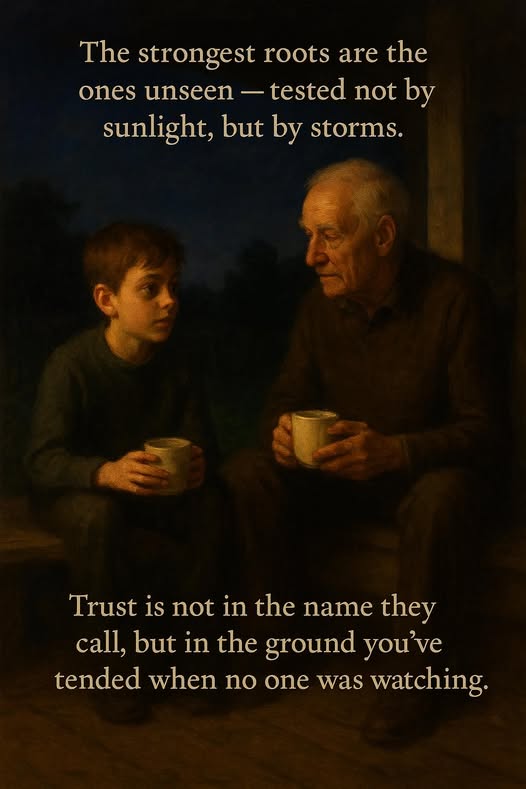
The porch was still. Night insects stitched the dark with a small, steady chorus. Emil rocked his cup of tea, watching the garden’s silhouette beyond the fence—stems bowed from the day’s wind, leaves still speckled with rain.
Grandfather poured another cup and set it on the tray. “You’re quieter than usual,” he said.
Emil blew on the steam. “How do you decide who to trust, grandpa? Whose promises mean anything? I keep wondering—will the garden grow, or will the next storm take more than it should?”
Grandfather folded his hands around the cup. “That’s the question older people call ‘wisdom.’ It’s not one answer—it’s many small signs that reveal a person’s true shape.”
He set the cup down and began to name them one by one, not as rules, but as signs to watch for:
“Watch what people do when no one is watching. Promises can be polished for an audience; deeds usually arrive quietly.
Watch how they treat the weak—not the friends who flatter them, but the one who cannot repay a favor. If someone uses power to protect the small, that tells you more than a thousand speeches.
Notice how they handle praise. Those who need constant applause often fear the silence that comes after. Those who can bear silence—who keep working when the crowd leaves—are steadier.
Listen to how they answer criticism. Do they learn, or do they build walls and blame others? A leader who listens becomes wiser; one who blames becomes alone.
See whether they share credit and accept blame. A man who throws others under a cart to save his own cloak cannot be trusted to guard the garden.
Finally, give them small tests. Offer a modest responsibility and watch whether they take it as duty or as a chance to boast.”
Emil held the words like warm bread. “But what if you’re wrong about someone? What if you trusted the wrong roots?”
Grandfather’s gaze stayed steady. “Then you change your course. Trust isn’t a single verdict—it’s a conversation you can continue, or end. Courage is not only in choosing well; it’s in admitting the mistake and replanting when needed.”
He looked toward the dark line of the garden. “Trust is not the absence of storms. It’s knowing who will stand with you in the rain—and who will count votes while the garden washes away. Trust is a feeling.”
Then his eyes caught the faint moonlight, fixing on Emil. “You ask about tomorrow’s count? Trust isn’t in the name they call. It’s in the ground beneath your feet tonight. Did you plant with integrity? Tend with care, even without applause? Bind the soil with honest work? That ground holds. That ground endures the wait—and whatever storm the count brings.”
The night felt less heavy now—not because the question was solved, but because Emil had a way to seek answers. He could feel the roots deep in the unseen dark, waiting for dawn.
He set the cup in its saucer and stood. “Tomorrow,” he said, “I’ll watch for the small things.”
Grandfather smiled, a proud, quiet curve. “That’s how a gardener learns his land.”

